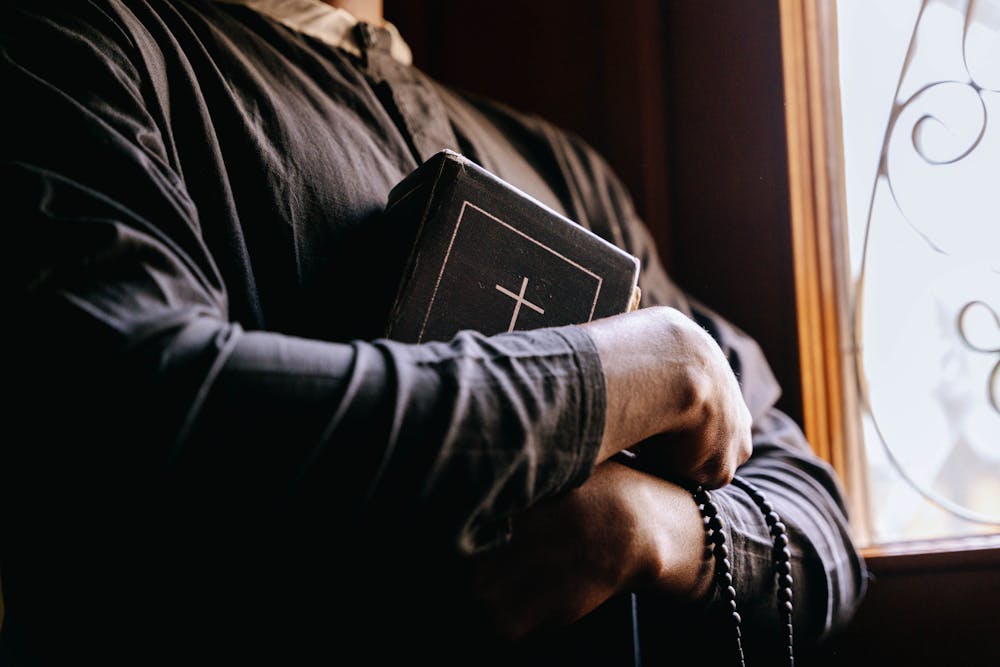If you’re a survivor of clergy or institutional abuse, know that you are not alone, and none of what happened was your fault. Healing from this kind of betrayal takes time and support, but help is available.
At Stronger Than, we’re here to help you find the support you need. That’s why we’ve compiled information on emotional, spiritual, and legal resources that can help you begin rebuilding safety, stability, and peace in your life.
Were You a Victim of Institutional Abuse?
Clergy and institutional abuse occurs when a person in a position of power or authority, such as a member of the clergy, school staff, or other organization leader, uses that power to commit sexual, physical, or emotional abuse.
Institutions that fail to protect victims, ignore complaints, or cover up wrongdoing are not just morally responsible, they can also be legally accountable for the harm caused.
This is because survivors often face unique challenges:
- Feelings of shame or guilt instilled by spiritual authority figures.
- Fear of rejection from their faith community or peers.
- Distrust of authority figures and systems.
- Lifelong trauma from being betrayed by a trusted organization.
Seeking help after such deep betrayal takes immense courage. But help is available, and healing is possible.
Emotional and Mental Health Resources
Healing from clergy or institutional abuse often begins with finding emotional and psychological support. The right help can make it easier to process trauma, rebuild self-trust, and feel safe again in your body and mind.
Trauma-Informed Therapy
Look for therapists who specialize in trauma recovery, sexual abuse, or spiritual abuse. Trauma-informed therapists understand how betrayal by authority figures can affect survivors differently and will help you move at your own pace.
Resources for finding a trauma-informed therapist include:
- RAINN (Rape, Abuse & Incest National Network) – rainn.org offers confidential hotlines and a directory of local counseling centers.
- Psychology Today’s Therapist Finder – You can filter by trauma specialty and therapy type.
- The International Society for the Study of Trauma and Dissociation (ISSTD) – Focused on complex trauma and dissociation.
Support Groups for Survivors of Religious or Institutional Abuse
Hearing from others who have gone through similar experiences can be profoundly healing. These support groups provide understanding, community, and validation.
- SNAP (Survivors Network of those Abused by Priests) – Offers peer-led support and advocacy for those harmed by religious institutions.
- The Hope of Survivors – Faith-based organization offering counseling and education for those abused by clergy.
- Therapy Den or Mental Health Match – Platforms that list therapists and support groups that specialize in spiritual or institutional trauma.
Crisis Hotlines
If you’re in crisis or need someone to talk to right now, help is available 24/7:
- National Sexual Assault Hotline: 1-800-656-4673 (confidential, free, and available nationwide)
- National Human Trafficking Hotline: 1-888-373-7888
- 988 Suicide & Crisis Lifeline: Dial 988 anytime to speak with trained counselors
You never have to face the pain alone. Support is always one call away.
Reconnecting Spiritually. If and When You’re Ready
Spirituality can be deeply intertwined with trauma in cases of clergy abuse. Some survivors find it difficult to reconnect with faith, while others find comfort and meaning in rebuilding their relationship with spirituality on their own terms.
There’s no right or wrong way to approach this part of healing. Some options include:
- Exploring spiritual counseling with someone outside your former faith community.
- Engaging in mindfulness or meditation practices that feel grounding and safe.
- Reconnecting with supportive communities that honor your boundaries and values.
Healing your spirit doesn’t have to mean returning to the same religious institution. It can mean finding peace, compassion, and strength in new spaces that respect you fully.
Legal and Advocacy Resources
Holding institutions accountable can be an empowering part of the healing process. Many survivors of clergy or institutional abuse choose to take legal action, not just for themselves, but to help protect others.
Survivor Advocacy Organizations
These groups work to expose wrongdoing, reform abusive systems, and provide support for survivors who want to speak out or pursue justice.
- SNAP (Survivors Network of those Abused by Priests) – Offers advocacy and assistance in navigating media, legal, and church responses.
- Bishop Accountability – Tracks and publishes data on clergy abuse cases and institutional cover-ups.
- End Clergy Abuse (ECA) – A global advocacy movement dedicated to holding religious institutions accountable.
Understanding Civil vs. Criminal Justice
Even if your abuser was never arrested or convicted, you may still have civil legal options.
- A criminal case focuses on whether someone violated the law and may result in prison time.
- A civil case allows survivors to pursue compensation for damages such as therapy costs, lost income, and emotional suffering.
Civil lawsuits can also expose patterns of institutional cover-up and prevent future abuse by forcing transparency and accountability.
Working With Trauma-Informed Legal Professionals
If you’re considering legal action, seek attorneys who are experienced in handling sexual abuse and institutional cases. They can:
- Explain your rights under current laws and statutes of limitations.
- Handle communication with the institution so you don’t have to.
- Protect your privacy and help ensure the process is as safe and empowering as possible.
At Stronger Than, we connect survivors with trauma-informed legal partners who understand the sensitivity of these cases and who will stand beside you with compassion and care.
Taking the Next Steps
Healing from clergy or institutional abuse takes time, and there is no one path forward. You may focus on therapy first, community second, or justice later, or you may choose all of them at once. What matters most is that each step you take is your choice.
Even if the person who abused you was never charged or convicted, the institution that enabled or ignored the abuse can still be held civilly liable. You have the right to seek justice and accountability from the organizations that failed to protect you.
At Stronger Than, we believe survivors deserve both healing and justice. Our team helps connect you to trauma-informed counselors, advocates, and legal professionals who can guide you safely through every part of your journey.
You are not alone. What happened to you matters. And it’s never too late to reclaim your voice, your safety, and your future.


